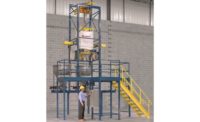![]() The Smith's Snackfood Company began manufacturing potato crisps (or, as they’re known in the U.S., chips) in Australia in 1931 and was the first to offer flavored crisps in Australia. Today, as a unit of U.S.-based PepsiCo, its brands include Twisties, Burger Rings, Doritos, Parker’s pretzels, as well as reduced-fat products such as Sakata rice cakes, Sunbites Grain Waves whole grain chips, and Sunbites air-popped popcorn.
The Smith's Snackfood Company began manufacturing potato crisps (or, as they’re known in the U.S., chips) in Australia in 1931 and was the first to offer flavored crisps in Australia. Today, as a unit of U.S.-based PepsiCo, its brands include Twisties, Burger Rings, Doritos, Parker’s pretzels, as well as reduced-fat products such as Sakata rice cakes, Sunbites Grain Waves whole grain chips, and Sunbites air-popped popcorn.
In January 2019, Smith’s installed a process line to manufacture Smith’s Oven Baked potato chips, which contain 50% less fat and have more crunch and texture than traditional fried crisps.
For the powder handling and blending portion of the new line, Smith’s worked with Flexicon Corporation Australia. Due to the size and scope of the new system, the supplier’s Project Engineering Division (PED) handled much of the design and specification work.
Upstream batch and downstream continuous processes
The new powder handling and blending system consists of two upstream batch processes that feed a downstream continuous process.
In one batch process, major ingredients received in bulk bags are dispensed by weight from two Bulk-Out model BFC bulk bag dischargers supplied by Flexicon. Installed facing one another, the matching dischargers are each equipped with an electric hoist and trolley that travel on an I-beam common to both frames, allowing bulk bags to be loaded from a single floor location.
The dischargers are each equipped with a Spout-Lock clamp ring atop a Tele-Tube telescoping tube that applies continual downward tension as the bag empties and elongates, directing material through the bag spout. The sealed systems of both dischargers are vented to a dust collection system installed in an adjacent room, preventing contamination of the plant environment.
Flow-Flexer bag activator plates raise and lower opposite bottom edges of the bags on timed cycles, ultimately forming a steep "V" shape that promotes total discharge. Both are also equipped with a Power-Cincher flow control valve in which contoured stainless steel rods cinch the bag spout concentrically, allowing dust-free retying of partially empty bags.
When a batch is initiated, the rotary airlock of either discharger begins metering material into a common pneumatic conveying line leading to a Flexicon filter receiver suspended on load cells. Weight gain information is transmitted to the system controller that runs the airlock valve at high speed, then at dribble feed rate, which, together with programmatic compensation for material in-flight, achieves precise batch weight accuracy.
Once major ingredients are batched in sequence from bulk bags, pre-weighed sacks of low-volume ingredients are positioned using a 55 lb (25 kg) vacuum sack lifter, and dumped manually through a Flexicon bag dump station with integral dust collector and rotary airlock valve feeding the same pneumatic conveying line. A chute through the sidewall of the bag dump hood leads to a Flexicon bag compactor with pneumatic ram that compresses up to 150 bags into a plastic lined container for dust-free disposal.
The batch accumulated in the filter receiver is then gravity discharged into a paddle mixer. Blended batches are discharged into a Flexicon buffer hopper that is sized to provide a continuous supply of material to the downstream process through a second pneumatic conveying system and filter receiver.
In a separate batch process, a Flexicon bag dump station―also with integral dust collector, compactor chute, and rotary airlock valve―is dedicated to manual additions of pre-weighed, pre-mixed inclusion ingredients. Positioned adjacent to the first bag dump station, it shares the same bag compactor, but meters material into a third pneumatic conveying system and filter receiver.
The second and third filter receivers are suspended on load cells that signal the system controller when to convey additional blended material from the buffer hopper, and from the second bag dump station respectively. These rotary airlock valves provide material on an as-needed basis to a pair of loss-in-weight (LIW) gravimetric feeders, which allow rapid changing of screws to suit material flow characteristics, at throughputs from 8.8 to 880lb/hr (4 to 400kg/hr). The overall arrangement allows the LIW feeders to provide an uninterrupted supply of material to a new continuous mixer at precise ratios and rates, completing the powder handling and blending portion of the new Oven Baked potato chips line.
Managing lockdowns and logistics
Flexicon’s PED recommended equipment specifications, coordinated multiple equipment manufacturers, and developed a controls and automation package for the bulk handling system that integrates with Smith’s overall process control system. For parts to be imported, the supplier obtained special exemptions to COVID-19 restrictions on crossing state borders.
“We had an aggressive schedule to get the new production line installed and commissioned on time and we ran into numerous challenges as a result of the Covid-19 pandemic,” says Nayantha Abeysiri, project manager, PepsiCo. “However, Flexicon found solutions to those challenges while staying on budget to get the equipment manufacturing completed on schedule.”
“The equipment design is efficient, hygienic, simple, and meets all EHS requirements and food safety standards,” Abeysiri goes on, adding that Flexicon is in the design phase for another project.




